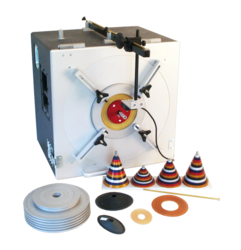Suspension Part Measurement (SPM)
Features and Benefits
- Specification of suspension parts
- Analysis of root cause of loudspeaker distortion
- Definition of mechanical limits
- Quality control in manufacturing
- Optimal driver design in R&D
The KLIPPEL SPM includes two modules for the measurement of medium and large size suspension parts (spiders, surrounds, cones). The SPM Lite is dedicated to the measurement of the mechanical stiffness k0 and other parameters in the small signal domain. In addition, the SPM lite can be used to measure the linear parameters of passive radiators.
The SPM Pro is additionally capable of measuring the nonlinear stiffness K(x) and the reciprocal compliance C(x) versus displacement in the large signal domain over the full range of operation of the final product.
A dynamic, nondestructive technique according to the IEC standard IEC62459 is applied in order to measure the parts under similar dynamic conditions as operated in the loudspeaker. This guarantees highest precision of the results as well as a simple handling and a short measurement time. Suspension parts are fixed in the measurement bench by using a set of clamping parts (rings, cones, cups) fitting to any size of circular shape up to 222 mm diameter. The working bench pneumatically excites the device under test to vibrate at the clamped resonance. The measured parameter is required for specifying the large signal properties of the suspension parts and to detect asymmetrical and symmetrical variation which are the cause for instable vibration behavior and nonlinear distortion.
Specification
Standard measurements
Requirements
Hardware
• Klippel Analyzer 3 (KA3)
Software
• dB-Lab
• SPM software
Module
• Transfer Function Measurement (TRF):
Measurement of transfer function and harmonic distortion
Accessories
• SPM or LST bench
• Clamping set (ring, cone, cup)
• Laser
• Amplifier
• PC
Demo Video (Introduction)
SPM Lite and Pro
SPM Lite
Measurement of resonance frequency, Q-factor and identification of linear parameters
- Stiffness
- Moving mass
- Mechanical resistance
in the small signal domain.
SPM Pro
In contrast to the linear model, the stiffness of a real suspension is not constant but varies with displacement x. Thus, the stiffness K(x) versus displacement reveals the nonlinearity of the suspension part. The SPM Pro measurement automatically determines the voltage and frequency of the excitation signal to measure the nonlinear stiffness at a specified target displacement. An additional long-term measurement mode allows to track changes of the nonlinear stiffness over a long excitation time.
The figure to the left shows the variation of the nonlinear stiffness versus time using the SPM module in the long-term measurement mode. While the suspension part is permanently excited at the target displacement (15 mm peak), the nonlinear stiffness is measured in 15 minute intervals.
Related Information
Other Modules of the R&D System
Suspension Part Measurement for Micro-Speaker - MSPM
Other Modules of the QC System
Fast Suspension Part Testing in Manufacturing - LST
Application Notes
AN 26 Suspension Part Measurement
AN57 Passive Radiator Measurement
Standards
IEC Standard IEC62459
Literature and Papers
Dynamic Measurement of Suspension Parts
Standards
International Electrotechnical Commission
IEC 60268-5, IEC 60268-7, IEC 60268-22, IEC 62458, IEC 62459, IEC WD 63034
European Standards
BS EN 54-24:2008
Audio Engineering Society
AES2-1984, AES2-1984
Patents
Germany: 102007005070; USA: 8,078,433B2; China: ZL200810092055.4; Japan: 5364271; India: 162/DEL/2008



